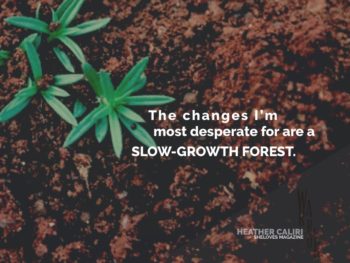I took Sarah Bessey’s little yellow firecracker of a book, Jesus Feminist, to worship a few months ago, hoping someone in my (not terribly conservative) church would ask me about it. Because Jesus Feminist is a book you want to have conversations about–a book that’s inviting, and warm, and a bold call for all of us to challenge patriarchy. But even better is a conversation with Sarah Bessey herself: as warm and inviting a firecracker as they come. Read on for Sarah’s take on the f-bomb, how uncontroversial feminism actually is, and how to stay centered when criticism comes.

What were the circumstances when you first called yourself a feminist out loud?
I never had a lot of baggage about the word “feminist.” I figured being a feminist was caring about what women cared about. I was so passionate about women! I have a sister. I have good and deep friendships. I really enjoy us.
When I was a leader in university in Tulsa, I began to care about women’s issues, particularly body image, eating disorders, and young women coming out of physically abusive relationships. I thought, “Of course these are the things I’m passionate about. Of course I’m a feminist.”
I thought it was funny when people would act as if I’d dropped an F-bomb. That happened later too, when we were in ministry in Texas. I defied a lot of the stereotypes of what people thought a feminist was. Saying it out loud opened up some eyes.
As people of faith, we should reclaim that word. Secular feminists need us at the table—even if they may not always realize it.
The word feminist offends some people. What lessons have you learned from a willingness to be offensive?
God has used blogging and writing books to root out my need to please others.
I have always compartmentalized my life and tried to avoid conflict. But eight years of blogging prepared me to do differently. After all that practice, I was ready to say something that was bold and controversial.
Let me be clear: I don’t think anything about my book is actually controversial. I think this message is fine, is redemptive, and freeing, and that I have nothing to apologize for. I don’t need to ask, “Is it okay to believe this?”
Getting to that place didn’t happen overnight. There were years of making mistakes, not handling things well, and writing angry. I had to learn to do better very organically. I’m incredibly proud of that journey.

I was really touched by Rachel Held Evans’ post about making origami from her hate mail. I hope that you haven’t received any, but if you have, how do you deal with it?
(Laughs) Oh, I’ve gotten my fair share.
I have learned to differentiate between criticism and haters. I feel strongly that not everyone who criticizes me is a hater.
It’s too easy to say, “If they’re not stroking me, then they hate my guts, and I can walk away from their critique.”
Sometimes I get pushback, and it’s deserved. It’s hard to admit when I hurt someone, even inadvertently.
That’s not the same thing as drive-by, personal attacks. Someone will say, “Oh, she’s just a fat feminist,” and then disappear. I don’t pay much attention to that.
But thoughtful criticism from people who have invested in me? That critique matters.
What are your initial reactions when you get pushback?
Oh, I’m just like everyone else. I get angry and hurt, and I cry. I call my sister, or a girlfriend. Or, I don’t finish reading it, then I stomp around the house and write emails in my head.
I don’t think any of us outgrow feeling wounded, but we can learn how to handle ourselves. I’ve learned to make space for processing the hurt.
It doesn’t feel good, but I don’t want to become someone who is cynical or bitter, or who feels constantly under attack.
The majority of interactions aren’t attacks. They’re just conversations.
I have to stay plugged into my real life, stay connected with community, church, and friends that really know me. Spiritual disciplines have helped: simple things like prayer and walks.
I have to shut down everything except the core of my identity in Christ. I have to know who I am. I know I’m not a threat, a heretic, or going to hell.
Finally, I have to take a few steps back before I engage. I only do so if there’s a way to have conversation and reciprocity.
You wrote a bit ago about how hard it is to continue writing after your book was launched—how the feeling that you have a “brand” to manage could so easily silence you. How do you continue to lean into your calling?
I’m still sorting through that. Obscurity is its own protection. Now, if I write something, it’s more exposed, and so there’s more of a cost involved. It’s tempting to play it safe.
For now, the way I’m handling that is to try not to be part of the machine—the Christian publishing, marketing blogosphere. It can churn outrage and marketing opportunities. I feel like a better person and artist when I have a bit of distance.
I worry about becoming another cog, another voice, and another person with a book to sell. I want to be Spirit-led, and not do things because I should. Yes, I want to learn from marketers, and be wise in my writing, but the thing that makes me me is a bit out of the machine. I don’t want to be someone’s brand.
That’s a hard line to walk. There’s always a certain amount of commercialization for artists. Clearly, there’s something in me that feels compelled to share publically—I’m not writing all this down in a journal. But I have to walk in awareness and caution.
I’m working on my second book right now. It’s about church. I know I’m not going to make anyone happy. But I can’t write for critics.
I have to write what is true, what I know. I have to write out of my scars, not open wounds.
I have to write where the Spirit has met me, and where I have found healing.
 Sarah Bessey is a writer and an award-winning blogger. She lives in Abbotsford, British Columbia, Canada, with her husband, Brian, and their three tinies: Anne, Joseph, and Evelynn.
Sarah Bessey is a writer and an award-winning blogger. She lives in Abbotsford, British Columbia, Canada, with her husband, Brian, and their three tinies: Anne, Joseph, and Evelynn.














 A simple, easy, life-changing invitation
A simple, easy, life-changing invitation
Great words here, Thank you Sarah for sharing and Heather for hosting. Thank you for sharing your rhythm of living from the Spirit, it is so easy to get tossed around by popular opinion, I find real wisdom here.
It’s so simple to refer to the Holy Spirit and think “that’s church speak” or “yeah so what” but it’s a totally other thing to genuinely tune in and live out of that.
Amen to that (speaking of church speak 🙂 I loved speaking to Sarah about how to firmly tether ourselves to God.
Love this, Heather and Sarah!
I had a similar experience with claiming “feminist” as an identity as a young adult–of course I care about women’s issues, which are people-issues. Doesn’t everyone? And yet, the word itself elicits the most interesting of reactions.
I can’t wait to read where the Spirit meets you next, Sarah. Best of luck as you write the next book!
It’s funny that you had such a similar experience. I am starting to appreciate the stances and words that force me into conversations with people–even if the conversations are sometimes uncomfortable.
The word feminism in the world I grew up in was just as bad as the word democrat… so…ya, to say the least, your article resonated with me… Much love and peace to you sister.
I’m so glad it resonated, Jenny. It’s empowering to stop being afraid of of this word.
Never will I cease to be blown away by how incredible, and grace-filled, and remarkable the beautiful Sarah Bessey is. With her feet firmly planted on the ground she speaks truth with utter love. Never write for the critics, if Jesus had done that we’d never have found freedom. I’m on a journey with this f-bomb, but it sure is becoming my friend.
Love this, Grace! I love being able to cheer on these truth-tellers and artists around us. “Never write for the critics, if Jesus had done that we’d never have found freedom.” Amen 🙂
Sarah I look forward to reading both of your books…My mother Patricia Ellen (1932-1975) said a few things that I remember before she left this world to early when I was sixteen. One of the most important was ‘I don’t need to be liberated. I was born liberated.’ She and her mother instilled this into me and I am living my faith in leadership for women in the Catholic Church. Releasing my fears and opening my voice!
‘I don’t need to be liberated. I was born liberated.’ I love this, Ellen. It’s one of the things I loved about talking to Sarah, and about her book. We simply don’t need to ask permission! We don’t need to argue. We can be bold and excited and invite others along without being defensive.
“I have to write out of my scars, not open wounds.”
That is INCREDIBLE writing advice.
Truth.
Great interview! Really appreciate Sarah’s responses regarding criticism and haters and processing those experiences that wound.
Yes–I’m becoming less scared of this possibility; it’s so good to speak about it with someone who has been there.